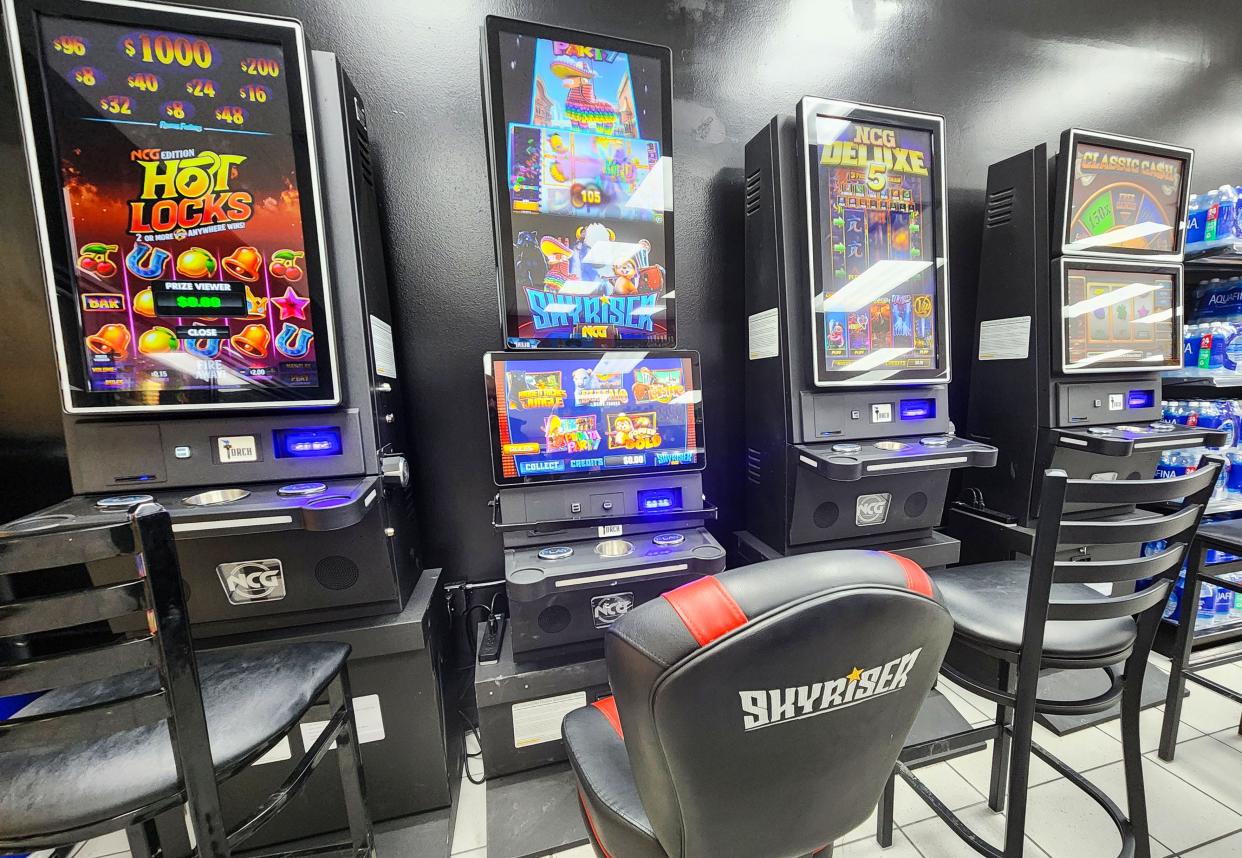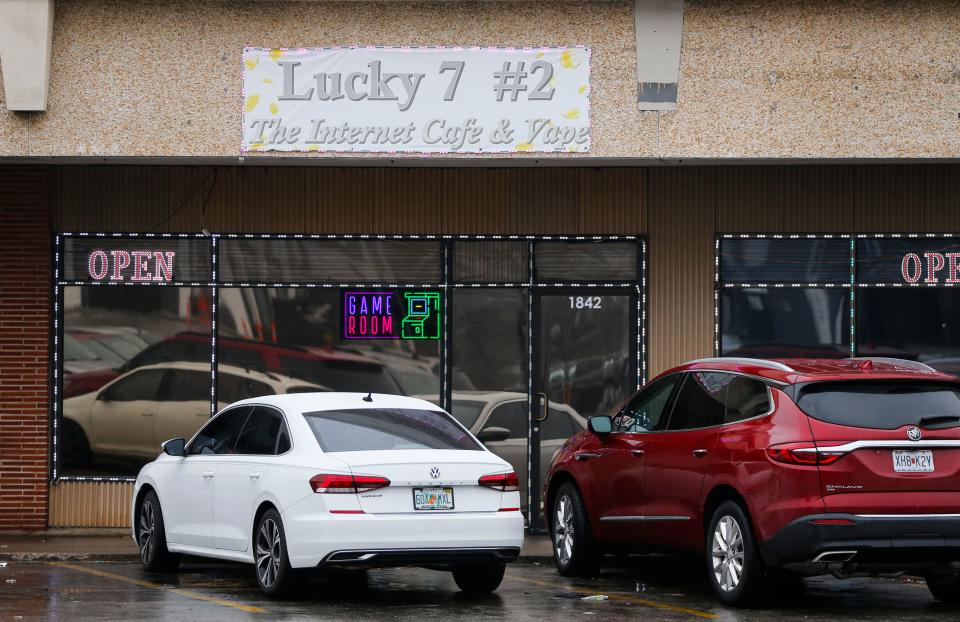'We need your help': Community reacts to city's proposal to ban 'no-chance' games

With regulation of video lottery terminals in limbo at the state level, Springfield City Council is considering taking matters into its own hands. At council's Monday night meeting, city staff presented an ordinance prohibiting the operation of any entertainment devices that offer any monetary prizes.
The video lottery machines have been a topic of discussion and concern on the council for years. The terminals, of questionable legality, have become increasingly common at gas stations and convenience stores and in bars and adult game rooms.
Known as "no chance" games, the entertainment devices attempt to bypass state statute that defines illegal gambling as games of chance by allowing the player to preview the outcome a given play. However, critics argue that gambling still takes place as the player player is really taking a chance on the subsequent play's outcome. The city does not have a permitting or licensing process for such machines and does not receive any tax revenue from them.
Council's legislative priorities include support for making the machines illegal statewide, but proposed regulation has been closely tied with the legalization of sports betting in the state legislature, resulting in a stalemate on both fronts.
With timely progress unlikely in Jefferson City, the city is looking to regulate the practice on its own. At Monday's council meeting, the topic drew comment from a total of 14 speakers from a variety of spheres including local organizations, neighborhoods associations, business operators and those with personal experiences gaming.
What does the ordinance propose?
The ordinance would amend city code to add a section on monetary prizes. It would prohibit the operation of "any entertainment device that offers a monetary prize to any person regardless of the frequency with which a monetary prize is conferred or the odds of any individual user realizing a monetary prize."
The city's chief litigator, Chris Hoeman, presented the ordinance and noted that it is focused on the monetary prize aspect rather than the form of gameplay, which is what falls under state regulations. Any gaming that results in a monetary prize, or a prize that can be easily converted to money such as gift cards, would be illegal if the ordinance is approved. This would include the electronic lottery terminals but not be exclusive to them. Arcades such as those at Chuck-E-Cheese or Incredible Pizza would not be affected, nor would live games that offer monetary prizes.

The ordinance also includes minimum penalties for breaking these regulations. Each device would constitute a separate offense, and with each offense the punishment becomes harsher. A first offense would result in a minimum $500 fine, second with a minimum $1,000 fine and a third with $1,000 fine and 30 days in jail. Hoeman said this is the most stringent punishment that the city code would include.
"Those were included ... to kind of overcome any profit motive to continue to operate the machines illegally," he said.
Community reacts with despair for change
Several business owners within the Plaza Shopping Center shared concerns about recently opened adult gaming rooms that include the terminals. They noted an increase in crime, deterioration of the area, safety concerns, the departure of other and overall negative impacts on the community.
"These game guys are not from our communities, they are not here to help our communities," said Nic Mertz, who operates Dings & Things Bodyworks right behind the Plaza. "They don't care about our communities."
Other speakers argued that the games foster addiction and expose more people to gambling by being in public and convenient places. Zachary Rogers, a leader at Freedom City Church, spoke about the obsession gaming machines can spark in individuals who already come from vulnerable backgrounds.
"Much like addiction, much like cocaine, much like fentanyl, much like methamphetamine, the obsession that is tied to these gaming rooms and gaming machines affects the children most of all," Rogers said as he recounted seeing kids sitting outside or by the machines as their parents played.
Opposition to the machines has been growing at the neighborhood level. Mona Pieron, vice president of the Woodland Heights Neighborhood Association, read a letter issued by the association noting its support for the bill and calling on the city to build on their grassroots efforts.
"We cannot push back against this alone, though," she said. "To stem this tide, we require City Council to act."
Other neighborhood associations including Bissett, Midtown and Robberson shared their support for the bill through Becky Volz, the chair of the Neighborhood Advisory Council.
Operators push back, argue no increase in crime
While outnumbered, four people spoke from the perspective of gaming machine operators, asking council to reconsider the impact banning the machines would have and the revenue lost without them.
Michael Goforth, commander of the American Legion Post 639, said the post operates about 11 "no chance" machines provided by Torch Electronics. Torch Electronics has been at the center of a class-action lawsuit for the games it operates. Goforth said the post receives about $2,000 per month from the machines, which helps the organization expand the work it does in the community. Additionally, the post is not open 24 hours and sees patronage only from members and their guests, not the wider public, he said.
After hearing from Goforth, council members appeared open to amending the proposal to carve out an exception for controlled and limited use of machines at establishments like the American Legion. That was not the case for those who operated public businesses dedicated to the machines.
More: Cardinals lead effort to bypass legislature, take sports betting to Missouri voters
Adam Naegler with Fast 'N Friendly said he has not seen an increase in crime since the machines were installed a few years ago in the stores they run. He said the machines continue to bring in revenue that helps business thrive. He said the focus should be on the gaming rooms focused more exclusively on the terminals.
The code change will be voted on at council's next meeting, Feb. 12.
Marta Mieze covers local government at the News-Leader. Contact her with tips at mmieze@news-leader.com.
This article originally appeared on Springfield News-Leader: Loophole gambling devices considered for local ban in Springfield

